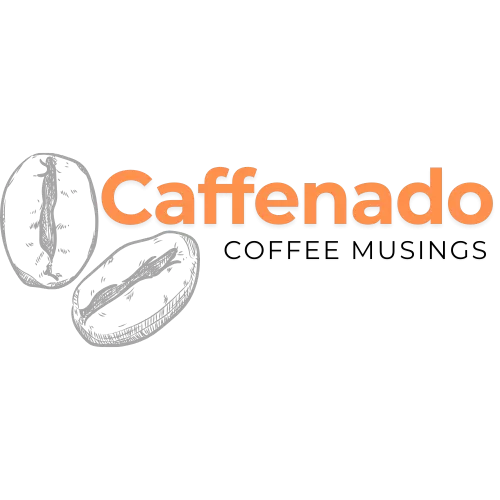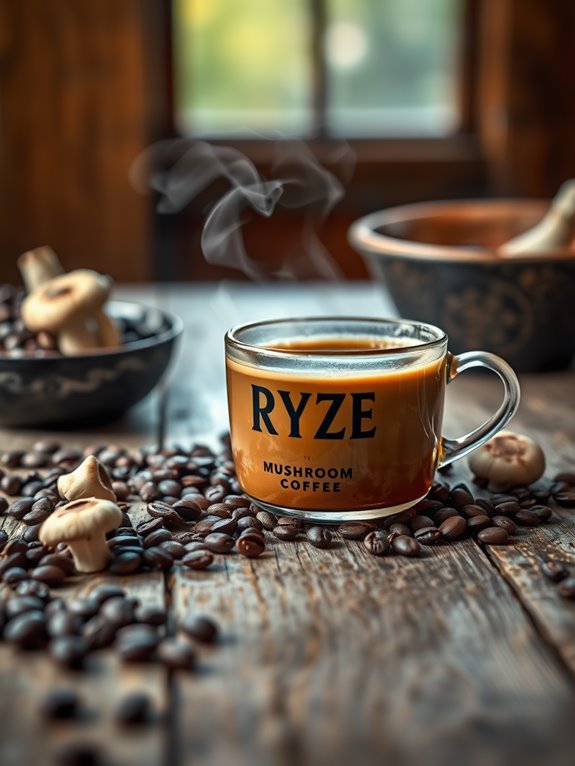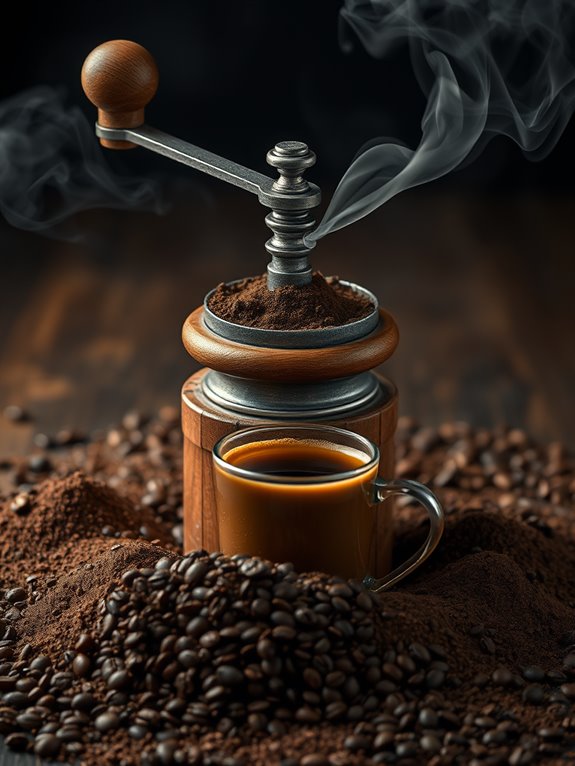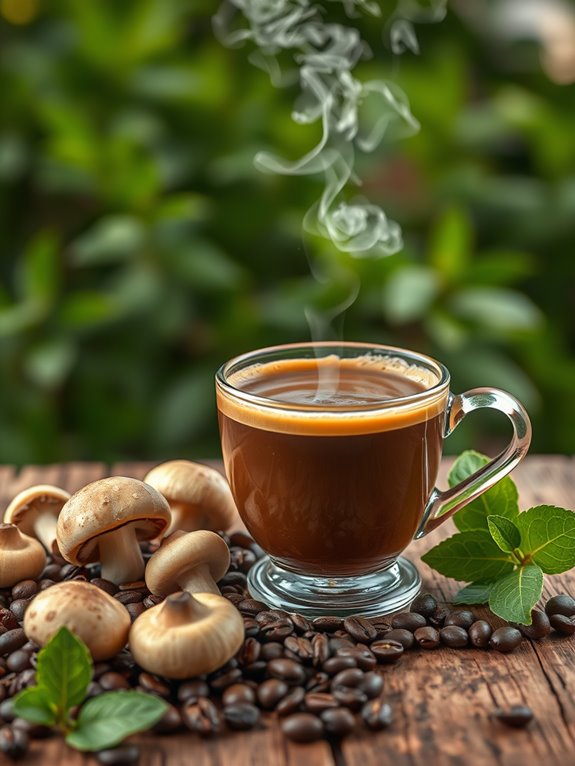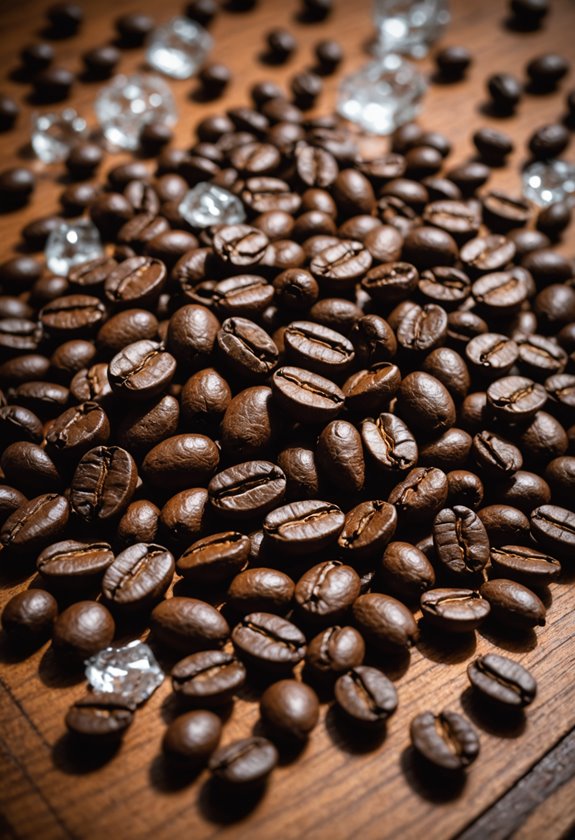Can You Boil Coffee Beans to Make Coffee?
Boiling whole coffee beans isn't the best way to brew coffee, as it causes over-extraction and can lead to a bitter taste. This happens because boiling exceeds the ideal brewing temperature range of 195-205°F, releasing excessive oils and unwanted flavors. Ground coffee, on the other hand, allows for superior flavor extraction, creating a richer aroma and better-tasting cup. Grinding your beans before brewing is essential for achieving the best flavor. There are many effective methods like French Press and pour-over, each offering unique advantages. For a flavorful coffee experience without bitterness, understanding brewing techniques is key, enhancing your daily brew.
Key Takeaways
- Boiling whole coffee beans can lead to over-extraction and a bitter taste.
- The boiling process often exceeds the ideal brewing temperature range for coffee.
- Whole beans hinder flavor extraction, resulting in a weaker and less aromatic brew.
- Regular consumption of boiled coffee may introduce health risks due to over-extraction.
- Alternative methods like French Press or Chemex provide better flavor and aroma.
Why Boiling Beans Isn't Ideal

Although it might seem like a straightforward method, boiling coffee beans isn't ideal if you're aiming for a flavorful cup. When you boil coffee beans, you risk over-extraction, resulting in a bitter taste because oils and compounds are excessively released. The water temperature often exceeds the ideal brewing range of 195 to 205 degrees Fahrenheit, which can negatively affect both the flavor and aroma of your coffee.
Coffee lovers who appreciate a smooth brew might find a burnt or powdery taste instead, making it less pleasurable. Those seeking sustainable alternatives can even repurpose unused beans into eco-friendly jewelry rather than boiling them.
Flavor Extraction and Ground Coffee
Boiling whole beans is also less effective than using ground coffee. Ground coffee allows for better flavor extraction, whereas whole beans hinder this process, leading to a weaker and less aromatic cup.
For those who savor the rich aroma of coffee, boiling isn't the best choice.
Health Risks
Additionally, regularly consuming boiled coffee can pose health risks. It's advisable to reflect on alternative brewing methods that maintain flavor integrity and reduce potential health concerns.
Best Ways to Brew Coffee
When it comes to brewing the perfect cup of coffee, selecting the right method can make all the difference in flavor and aroma.
Let's investigate some of the best ways to brew coffee, starting with the simple stovetop method. By boiling ground coffee for 2-3 minutes, you can achieve a strong flavor, but be cautious of bitterness from over-extraction. Instead, consider steeping the grounds in water heated to 195-205 degrees Fahrenheit for ideal extraction without boiling.
Another popular method is the French Press. This process allows for full immersion of the ground coffee, steeped for about 4-5 minutes before pressing down the plunger, resulting in a rich and bold cup.
Selecting high-quality coffee beans is crucial for achieving the best possible flavor in any brewing method.
Here are some different coffee brewing methods you might try:
- Stovetop Boiling: Quick, strong, but watch for bitterness.
- French Press: Full immersion for deep flavors.
- Chemex: Uses a special filter for a clean, smooth cup.
- Pour-Over: Control over water flow and brewing time.
- Mason Jar: Unique steeping method for cold brews.
Experimenting with these methods can uncover new flavors and textures. Each brewing process offers a unique way to enjoy your coffee, enhancing its natural characteristics.
Enhancing Your Coffee Experience

Enhancing your coffee experience starts with choosing high-quality, freshly roasted beans, which remarkably improves flavor. The unique taste of your coffee begins with selecting the right ground coffee beans. To brew coffee using hot water effectively, avoid boiling water directly with the beans. Instead, steep the coarse grind in water just after boiling to improve flavor without bitterness. While home roasting using popcorn poppers provides ultimate freshness, it requires careful monitoring of temperature and timing.
Understanding the Brewing Process****
When brewing coffee, using the desired amount of coarse grind can meaningfully impact the flavor of coffee. An ideal grind size allows for a balanced extraction, minimizing the risk of bitterness from over-extraction.
Experimenting with different grind sizes can help you find the perfect coffee taste that suits your preferences.
Adding Unique Flavors
To enhance your coffee experience, consider incorporating spices or flavored syrups during brewing. These additions can create pleasing variations in your coffee, turning a simple cup into a memorable treat.
By experimenting with different ingredients, you can customize and amplify the aroma and flavor intensity.
Let's investigate the possibilities by trying various combinations and techniques, ensuring each cup offers a unique adventure of flavors. With these methods, you'll uncover endless ways to savor and enjoy your perfect cup of coffee.
Conclusion
Let's investigate why boiling coffee beans isn't the best choice. Boiling can extract bitter compounds, leading to an unpleasant taste. Instead, try brewing methods like drip, French press, or espresso, which highlight the beans' flavors. Experiment with grind size, water temperature, and brewing time to enhance your coffee experience. By understanding these techniques, you'll enjoy a delicious cup every time, appreciating the rich aromas and complex flavors that properly brewed coffee offers. Enjoy your coffee adventure!
